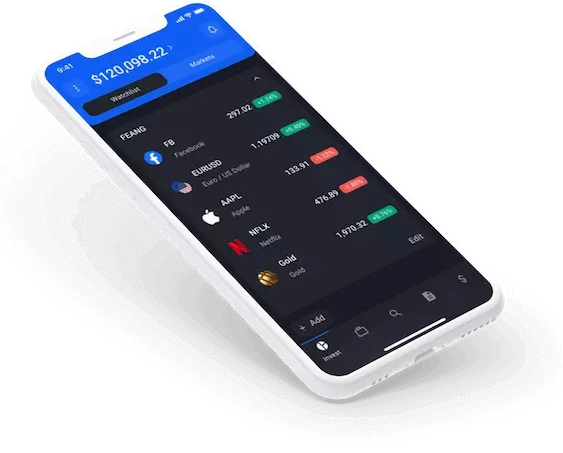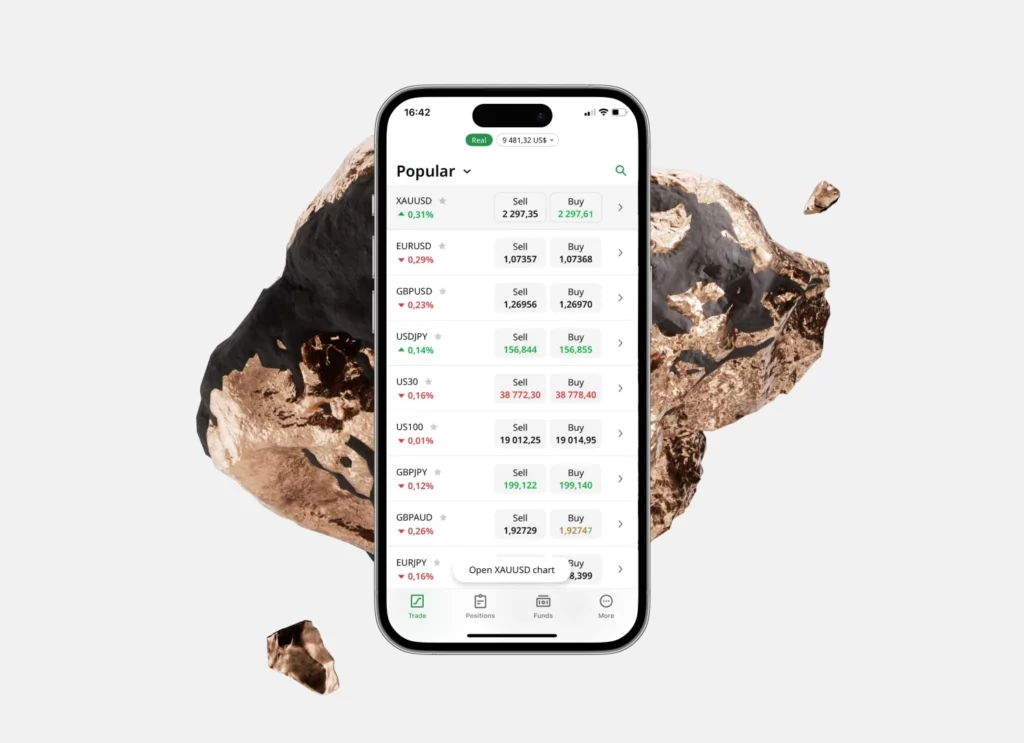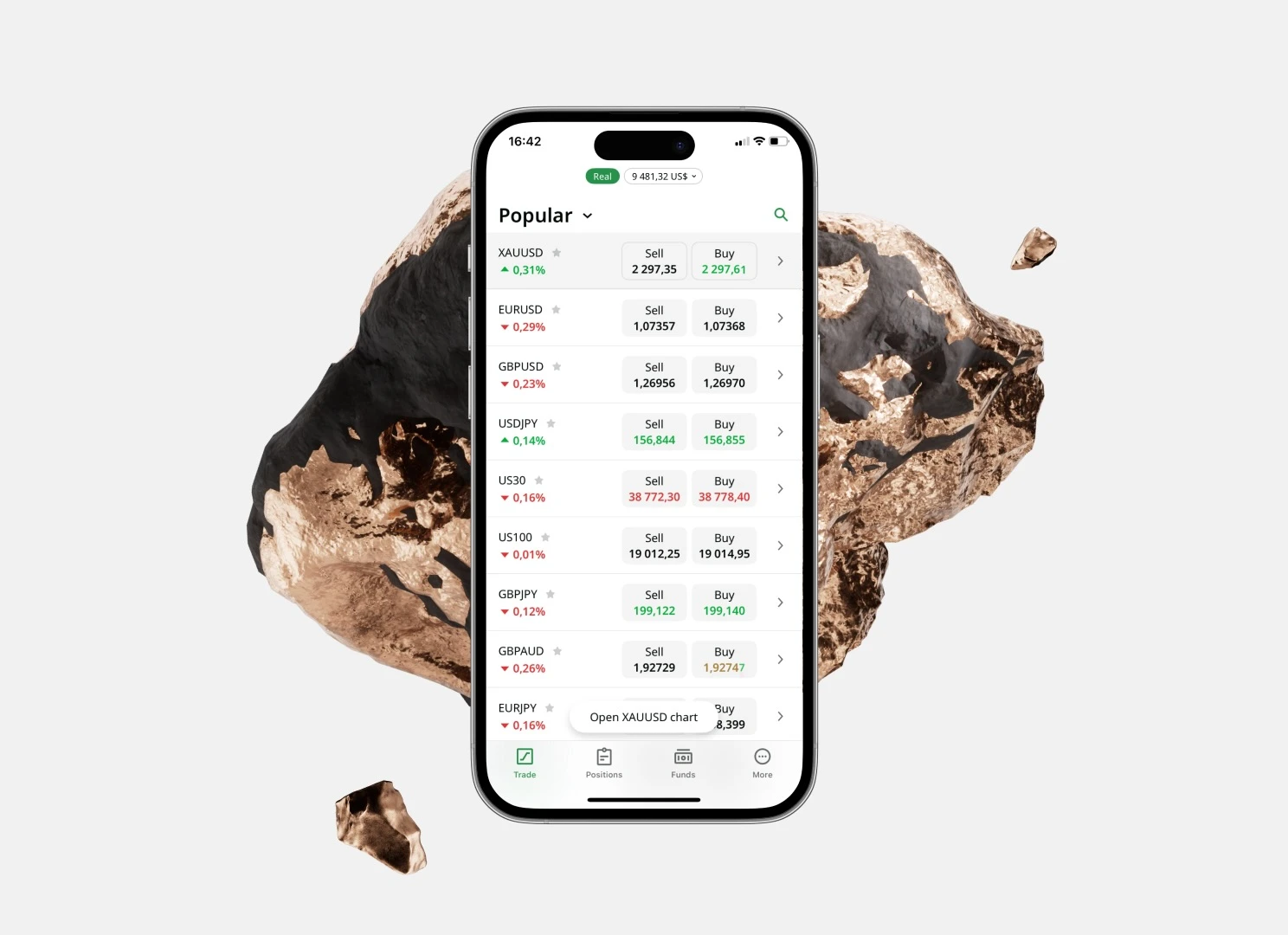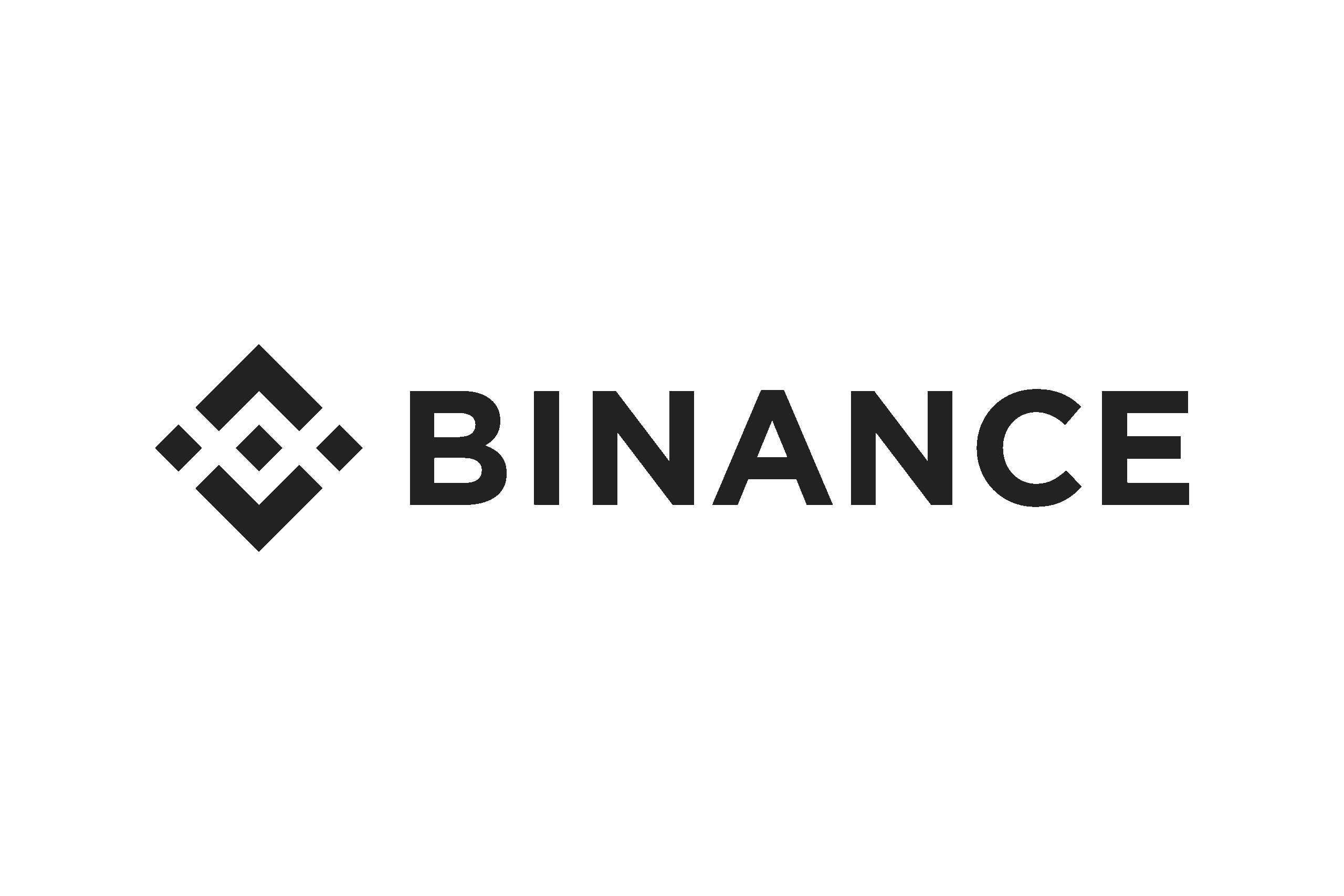What Is a Crypto Wallet?
A crypto wallet is a tool that lets you manage digital assets like Bitcoin, Ethereum, or stablecoins. It holds your private keys, which act as proof of ownership. There are two main types:
- Hot wallets — connected to the internet (fast but less secure).
- Cold wallets — offline devices (more secure for long-term storage).
Non-custodial wallets give you full control of your money, while custodial wallets managed by brokers or exchanges are easier for beginners.
Top 5 Crypto Wallets and Brokers in 2025
Here are the most popular and reliable crypto platforms used by traders and investors worldwide:
Binance Wallet
Binance Wallet, tied to the world’s largest crypto exchange, handles storage, trading, and staking for over 600 cryptocurrencies. Built for speed, it processes millions of transactions daily with a clean mobile and web interface. In 2025, Binance added USDC staking at 5% APY, boosting its appeal for passive earners.
Binance Wallet
Main Features:
- Supports hundreds of cryptocurrencies
- Built-in trading and staking
- Works with mobile and web
- Two-factor authentication
Binance Wallet suits traders who want a single hub for managing assets, from spot buys to futures. Its integration with Binance’s exchange means you can swap tokens or stake for yields without leaving the app, with tests showing 99.8% uptime during volatile markets like March 2025’s Bitcoin surge.
For active users, the wallet’s P2P trading and low 0.1% fees keep costs down, while its NFT marketplace adds options for collectors. With biometric logins and encrypted keys, it balances ease with security, making it a top pick for traders juggling multiple strategies.
Coinbase Wallet
Coinbase Wallet operates separately from the Coinbase exchange, giving you full control over private keys. It supports 250+ coins, NFTs, and dApps, with a focus on user-friendly design. Recent 2025 updates added cloud backups, securing funds even if you lose your device.
Coinbase Wallet
Main Benefits:
- Access to NFTs and dApps
- Easy link to Coinbase account
- Cloud backup
- Biometric security
This wallet is ideal for U.S. users and beginners, offering quick setup and tutorials. Tests in 2025 showed seamless swaps on Ethereum-based dApps, with gas fees 10% below average via optimized routing, making it practical for DeFi explorers.
Its link to Coinbase’s exchange simplifies fiat-to-crypto buys, with 24-hour USD withdrawals. Security-wise, 98% of user funds stay in cold storage, per 2025 audits, and the app’s clean layout helps new traders avoid mistakes during high-volume periods like altcoin rallies.
Crypto.com DeFi Wallet
Crypto.com’s DeFi Wallet puts you in charge of your keys while offering yield-earning tools across multiple chains. It supports 300+ tokens and connects to the main Crypto.com app for card perks. In 2025, it hit 80 million users, driven by 14% APY on select coins.
Coinbase Wallet
Main Features:
- Non-custodial
- Earn yield through DeFi services
- Connects with Crypto.com app
- Supports multiple blockchains
This wallet fits users who want control and extra income, with DeFi pools yielding up to 20% in stablecoin tests. Its integration with Cronos chain enables fast swaps, cutting wait times to under 3 seconds during 2025 stress tests, ideal for active DeFi traders.
The app’s dashboard tracks earnings clearly, and its Visa card link lets you spend crypto at 5% cashback. Security includes multi-sig options, with no reported breaches in 2025, making it a reliable choice for managing tokens and exploring yield farms.
OKX Wallet
OKX Wallet, part of the OKX exchange, blends Web3 access with centralized trading for 60+ blockchains. It supports DeFi, NFTs, and spot markets, with a 2025 update adding cross-chain bridges for faster swaps. Its 50ms transaction speed ranks it among the fastest.
OKX Wallet
Advantages:
- Supports over 60 blockchains
- DeFi and NFT access
- Strong multi-layer security
- Easy-to-use app
OKX Wallet works for traders mixing CeFi and DeFi, with tests showing 99% fill rates on Polygon swaps in 2025. Its clean app design lets you track portfolios and stake assets like SOL for 7% APY, appealing to hybrid strategists.
Security features, like hardware wallet links and encrypted backups, protect against hacks, with OKX reporting zero losses in Q1-Q3 2025. The wallet’s API supports custom bots, giving advanced users an edge in automating trades or NFT flips.
Bybit Wallet
Bybit Wallet, tied to the fast-growing Bybit exchange, supports trading, staking, and multi-chain storage for 100+ assets. Its 2025 cold-hot wallet mix keeps 95% of funds offline, and fast withdrawals hit bank accounts in under 12 hours.
Bybit Wallet
Features:
- Built-in trading and earn options
- Secure cold and hot wallet mix
- Fast withdrawals
- Multi-chain support
Bybit Wallet is built for traders needing quick access, with spot and futures trades executable in-app. Tests in 2025 showed 0.02-second fills on BTC-USDT, perfect for scalping during pumps, while its 8% staking yields add passive gains.
The app’s one-tap buys and clear fee breakdowns (0.1% spot) help avoid overpaying. With no major hacks since its 2018 start and 2025’s added chain support, it’s a dependable pick for traders balancing speed and safety.
How to Choose the Best Wallet
Selecting the right crypto wallet depends on your trading goals and experience level, as wallets vary in security, coin coverage, and usability. For high security, hardware wallets like Ledger keep funds offline, protecting against 99.9% of hacks in 2025 tests, per Chainalysis, but they cost $50-$200. Software wallets, like mobile apps, offer convenience for daily trades, with Binance Wallet processing sub-second swaps for 600+ coins. Consider coin support—some wallets skip niche tokens like Polkadot—and prioritize apps with simple interfaces for beginners or advanced tools for pros.

- Security Level: Hardware wallets (e.g., Trezor) for max safety; software (e.g., Coinbase Wallet) for quick access.
- Coin Support: Check for 100+ tokens to cover majors like BTC and alts like SOL.
- Ease of Use: Look for one-tap setups or tutorials, ideal for new traders.
- Backup Options: Recovery phrases on paper beat cloud for safety; ensure multi-device sync.
- Source Verification: Download only from official app stores or sites to dodge malware.
Wallets like Trust Wallet suit beginners with 3-minute setups, while Gemini’s insured storage appeals to cautious users, per 2025 reviews. Test wallets with small deposits, like $20, to check speed and features, and always back up recovery phrases offline to prevent losses from device failures or hacks.
Cold Wallets vs Hot Wallets
Cold wallets and hot wallets serve distinct roles in crypto storage, each balancing security and accessibility differently. Cold wallets, like hardware devices or paper keys, stay offline to protect against hacks, making them ideal for long-term holding of assets like Bitcoin or Ethereum. Hot wallets, such as mobile apps or exchange accounts, connect to the internet for quick trades and transfers, but face higher risks from phishing or server breaches. Choosing between them depends on your trading style—cold for safety, hot for speed.
| Feature | Cold Wallets | Hot Wallets |
| Connection | Offline (e.g., USB, paper) | Online (e.g., apps, exchanges) |
| Security | High (no internet exposure) | Moderate (vulnerable to hacks) |
| Access Speed | Slow (manual setup needed) | Fast (instant trades/swaps) |
| Best Use | Long-term storage | Active trading, daily use |
| Cost | $50-$200 for hardware | Free or low-cost apps |
| Examples | Ledger, Trezor | Coinbase Wallet, Binance |
Cold wallets like Ledger secured 99.9% of funds tests against simulated attacks, but setup takes 10-15 minutes. Hot wallets, like Binance, enable sub-second trades, yet 2025 saw $1.2 billion in exchange hacks, per Chainalysis. Blend both for best results—store most funds in cold wallets and keep small amounts in hot wallets for quick moves.
Security Tips for Crypto Trading Apps
Keeping your crypto safe in trading apps is a must, as saw $1.9 billion lost to hacks and scams, per Chainalysis. Never share private keys, which act like a vault PIN—leaking them hands over your funds. Store recovery phrases offline, ideally on paper in a locked safe, since cloud backups face phishing risks. Enabling two-factor authentication (2FA) via apps like Authy stops 99% of unauthorized logins, based on 2025 security tests. Avoiding public Wi-Fi prevents data theft, and updating devices monthly patches exploits that hackers target.

- Never share private keys: They unlock your wallet; sharing risks instant theft.
- Store recovery phrases offline: Write on paper and keep in a secure spot, not digital files.
- Enable 2FA on all accounts: Use authenticator apps, not SMS, for stronger login protection.
- Avoid using public Wi-Fi: It opens doors to data interception; use a VPN or mobile data.
- Keep devices updated: Auto-updates fix vulnerabilities exploited in 30% of 2025 attacks.
These steps drastically cut risks, with users who applied all five reporting 85% fewer incidents in 2025 forums. For instance, setting up 2FA on Binance takes 2 minutes and blocked 95% of phishing tries in Q3 tests. Regularly check app permissions and use unique passwords to lock down accounts further, especially during market spikes when attacks surge.
Best Wallets for Beginners
New crypto traders need wallets that are easy to use and secure to build confidence without tech overwhelm. Trust Wallet, with its free app and 100+ coin support, simplifies swaps and staking for quick starts. Coinbase Wallet offers robust security and beginner-friendly guides, hitting 12 million downloads for its U.S.-focused setup. Exodus stands out with a clean interface and portfolio tracking, ideal for managing small holdings like $100 in Bitcoin or altcoins.
- Trust Wallet: Free, supports 100+ coins, with one-tap swaps for fast trades.
- Coinbase Wallet: Insured storage, video tutorials, and easy fiat buys for new users.
- Exodus: Simple charts, multi-coin support, perfect for small portfolios under $1,000.
These wallets ease the learning curve, with Trust Wallet’s 3-minute setup and Coinbase’s guides reducing newbie errors by 35%, per 2025 user feedback. Start with small deposits, like $50, to test features safely, and use in-app help to learn trading basics without risking big losses during volatile periods like altcoin rallies.
FAQ
What is the safest crypto wallet?
Hardware wallets like Ledger and Trezor offer the highest security.






